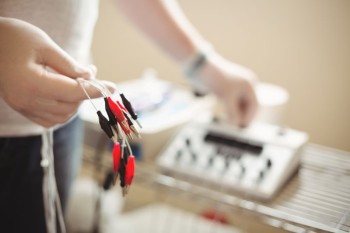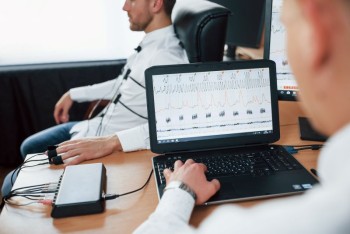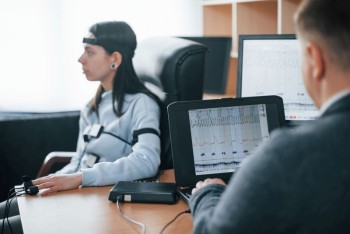
These tests evaluate the speed and efficiency of electrical impulses traveling along nerves, providing valuable insights into nerve functionality.
Nerve Conduction Velocity (NCV) in India with Cost
Nerve Conduction Velocity (NCV) or Nerve Conduction
Study (NCS) Four Limbs in Detail
Introduction to Nerve Conduction Velocity (NCV) and Nerve Conduction Study (NCS)
Nerve Conduction Velocity (NCV) and Nerve Conduction Study (NCS) are integral components of neurophysiological assessments, playing a pivotal role in diagnosing and understanding various nerve-related disorders. These tests evaluate the speed and efficiency of electrical impulses traveling along nerves, providing valuable insights into nerve functionality.
Purpose of NCV/NCS Tests
The primary purpose of NCV/NCS tests is to diagnose and assess nerve-related disorders. These tests help differentiate between sensory and motor nerve issues, providing crucial information for healthcare professionals to develop targeted treatment plans.
Principles of NCV/NCS
NCV/NCS tests measure the speed at which electrical impulses travel along nerves. By applying controlled electrical stimuli and recording the nerve's response, these tests reveal the efficiency of nerve conduction. Understanding the principles behind NCV/NCS is essential for accurate interpretation and diagnosis.
Equipment Used in
NCV/NCS Tests
Specialized equipment is utilized in NCV/NCS tests, including electrodes for stimulating nerves, stimulators for controlled impulses, and recording devices to capture nerve responses. The quality and precision of this equipment are paramount for obtaining reliable and accurate results.
Procedure for NCV/NCS Tests
The procedure for NCV/NCS tests involves patient preparation, electrode placement, and controlled stimulation of nerves. This process is repeated for various nerves in all four limbs, allowing a comprehensive assessment of the entire nervous system.
Interpretation of NCV/NCS Results
Interpreting NCV/NCS results involves analyzing normal and abnormal values. Deviations from the normal range can indicate nerve damage or dysfunction, and healthcare professionals correlate these findings with potential underlying conditions.
Applications of NCV/NCS in Diagnostics
NCV/NCS tests are widely used in diagnosing conditions such as peripheral neuropathy, carpal tunnel syndrome, and radiculopathy. The information obtained guides healthcare professionals in developing targeted treatment plans based on the specific nerves involved.
Types of NCV/NCS Tests
There are two primary types of NCV/NCS tests: Motor NCV and Sensory NCV. Motor NCV assesses the speed of impulses along motor nerves, controlling muscle movement, while Sensory NCV evaluates the speed of impulses in sensory nerves, responsible for transmitting sensations like touch and temperature.
NCV/NCS in Neurology
In neurology, NCV/NCS tests play a crucial role in diagnosing and monitoring neurological conditions such as multiple sclerosis, Guillain-Barré syndrome, and diabetic neuropathy. These tests offer valuable insights into the extent of nerve involvement and aid in treatment decisions.
Comparative Analysis
with Other Nerve Assessment Techniques
Comparing NCV/NCS with other nerve assessment techniques like electromyography (EMG) and imaging studies helps healthcare professionals understand the strengths and limitations of each method. NCV/NCS provides specific information about nerve conduction, complementing the broader insights of other tests.
Nerve Conduction Studies in Orthopedics
Orthopedic specialists frequently employ NCV/NCS to identify nerve compression or entrapment conditions, contributing to the planning of surgical interventions. These studies ensure precise targeting of affected nerves, enhancing patient outcomes.
Challenges and Considerations in Conducting NCV/NCS Tests
Various factors can influence the accuracy of NCV/NCS tests, including patient cooperation, body temperature, and the presence of certain medications. Addressing these challenges is essential for obtaining reliable and clinically relevant results.
Recent Technological Advancements in NCV/NCS Testing
Recent technological advancements in NCV/NCS testing include innovations in electrode design, signal processing algorithms, and improved stimulator devices. These developments enhance the efficiency of tests and contribute to a more comfortable patient experience.
Future Trends in NCV/NCS Technology
The future of NCV/NCS technology is expected to witness advancements in both methodology and technology. Integration with artificial intelligence for data analysis, miniaturization of equipment, and advancements in telemedicine applications are anticipated to reshape NCV/NCS testing approaches.
Case Studies Demonstrating NCV/NCS Success
Real-world case studies demonstrate the success of NCV/NCS in diagnosing and managing various nerve-related conditions. From accurate localization of nerve injuries to guiding effective treatment strategies, these cases highlight the versatility and effectiveness of NCV/NCS in clinical practice.
Patient Preparation for NCV/NCS Tests
Patients undergoing NCV/NCS tests should be informed about the procedure and any necessary preparations. This includes avoiding certain medications that may interfere with test results and ensuring the testing environment is conducive to accurate measurements.
Conclusion
In conclusion, Nerve Conduction Velocity (NCV) and Nerve Conduction Study (NCS) stand as indispensable tools in modern medical diagnostics. Their applications span across neurology, orthopedics, and beyond, contributing to comprehensive patient care and treatment planning.
FAQs About NCV or NCS
Is NCV/NCS testing painful?
NCV/NCS
testing is generally well-tolerated and minimally uncomfortable. Patients may
feel a brief, mild electrical sensation during the test.
How long does an NCV/NCS test typically take?
The duration of an NCV/NCS test depends on the specific nerves being evaluated, but it usually ranges from 30 minutes to an hour.
Can NCV/NCS tests diagnose conditions other than nerve disorders?
While NCV/NCS is primarily used for nerve-related conditions, it can also provide insights into certain muscle disorders, contributing to a comprehensive diagnostic assessment.
Are there any risks associated with NCV/NCS tests?
NCV/NCS tests are generally safe, with minimal risks. Some patients may experience mild discomfort or skin irritation at the electrode sites.
Is NCV/NCS covered by insurance?
In many cases, NCV/NCS tests are covered by insurance, especially when deemed medically necessary. Patients are advised to verify the specific details of their coverage with their insurance provider.
Are there any age
restrictions for NCV/NCS testing?
NCV/NCS testing can be performed on individuals of various ages, from children to the elderly. The testing approach may be adjusted to accommodate specific age groups.
Can NCV/NCS diagnose the
cause of chronic pain?
NCV/NCS tests can
provide valuable information about nerve-related causes of chronic pain.
However, a comprehensive assessment by healthcare professionals is necessary to
determine the specific cause.
Is there any preparation
required before NCV/NCS testing?
While specific
preparations may vary, patients are typically advised to inform their
healthcare provider about medications and health conditions. In some cases,
avoiding caffeine and certain medications before the test may be recommended.
Can NCV/NCS be performed during pregnancy?
NCV/NCS testing is generally safe during
pregnancy, but healthcare providers may modify the testing approach to ensure
the safety of both the mother and the baby. It's crucial to inform the
healthcare provider about pregnancy before the test.
How soon can results from NCV/NCS tests be obtained?
The turnaround time for NCV/NCS results
varies, and patients typically receive the results during a follow-up
appointment with their healthcare provider. The timeframe may depend on the
complexity of the test and the lab's processing times.
What happens if a
patient experiences discomfort during NCV/NCS testing?
Patients may experience
mild discomfort during the test, but it is generally temporary. Healthcare
providers can adjust the settings or take measures to minimize discomfort, and
patients are encouraged to communicate any concerns during the test.
Can NCV/NCS tests be repeated, and how often?
NCV/NCS tests can be repeated as needed
based on the patient's condition and healthcare provider's recommendations. The
frequency of repeat tests depends on the specific diagnostic goals and the
progression of the condition being monitored.
How does NCV/NCS testing differ from imaging studies like MRI or CT scans?
NCV/NCS tests focus on assessing nerve
functionality by measuring electrical impulses, providing complementary
information to imaging studies. While imaging studies offer detailed anatomical
information, NCV/NCS evaluates the physiological aspects of nerve conduction.
Are there alternative diagnostic methods to NCV/NCS?
Alternative methods include electromyography (EMG), imaging studies, and blood tests. The choice of diagnostic method depends on the specific goals of the assessment and the suspected underlying conditions.
Can NCV/NCS tests diagnose conditions affecting both sensory and motor nerves?
Yes, NCV/NCS tests are designed to assess both sensory and motor nerves. The information obtained helps healthcare professionals understand the extent and nature of nerve-related issues affecting both functions.
(0)
Login to continue



